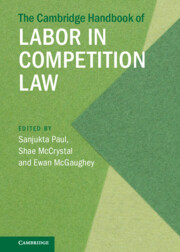Book contents
- The Cambridge Handbook of Labor in Competition Law
- The Cambridge Handbook of Labor in Competition Law
- Copyright page
- Contents
- Contributors
- Preface
- 1 Labor in Competition Law
- 2 Collective Labour Rights for Working People
- 3 Economic Coordination as Freedom of Association
- 4 The State’s Power to Govern in This Field Is Paramount: Antitrust, Labor, and the First Amendment
- 5 Competition Law as Collective Bargaining Law
- 6 Antitrust, Free Trade, and Fissuring
- 7 American Antitrust Exceptionalism
- 8 Competition and Labour Law in Canada
- 9 Workers and Competition Law in Japan
- 10 Workers and Competition Law in Australia
- 11 Workers and Competition Law in New Zealand
- 12 Competition Law and Labour Law
- 13 Workers and Competition Law in India
- 14 Competition and Labour Law in the United Kingdom
- 15 A Solution in Search of a Problem?
- 16 Competition and Labour Law in Germany
- 17 Labour Law and Competition Law Under French Regulation
- 18 Competition Law, Cartels and Collective Bargaining
- 19 The EU, Competition Law and Workers Rights
- 20 Is South American Collective Labor Law Confronted by Competition Law?
- 21 Conclusion
3 - Economic Coordination as Freedom of Association
Published online by Cambridge University Press: 05 May 2022
- The Cambridge Handbook of Labor in Competition Law
- The Cambridge Handbook of Labor in Competition Law
- Copyright page
- Contents
- Contributors
- Preface
- 1 Labor in Competition Law
- 2 Collective Labour Rights for Working People
- 3 Economic Coordination as Freedom of Association
- 4 The State’s Power to Govern in This Field Is Paramount: Antitrust, Labor, and the First Amendment
- 5 Competition Law as Collective Bargaining Law
- 6 Antitrust, Free Trade, and Fissuring
- 7 American Antitrust Exceptionalism
- 8 Competition and Labour Law in Canada
- 9 Workers and Competition Law in Japan
- 10 Workers and Competition Law in Australia
- 11 Workers and Competition Law in New Zealand
- 12 Competition Law and Labour Law
- 13 Workers and Competition Law in India
- 14 Competition and Labour Law in the United Kingdom
- 15 A Solution in Search of a Problem?
- 16 Competition and Labour Law in Germany
- 17 Labour Law and Competition Law Under French Regulation
- 18 Competition Law, Cartels and Collective Bargaining
- 19 The EU, Competition Law and Workers Rights
- 20 Is South American Collective Labor Law Confronted by Competition Law?
- 21 Conclusion
Summary
Labour lawyers are familiar with the binary divide between employees and the self-employed. Historically, this also demarcated the exclusion of competition law restraints on workers’ collective action. In recent times, growing numbers in the labour market are self-employed yet work in circumstances of economic disempowerment. They would benefit from collective bargaining, but competition law operates as a barrier to its realization. This chapter considers a ‘fundamental rights’ strategy for challenging competition law restraints. This strategy is based on the simple claim that the fundamental human right to bargain collectively is a right for ‘everyone’. The chapter identifies some weaknesses and problems with this approach within the European context. Abstractions like the ‘everyone’ argument can be counterproductive because human rights must be situated within existing power relations and economic structures in labour markets. Nevertheless, a suitably contextual fundamental rights strategy has an important role to play. On this contextual approach, reflected in the European Social Charter, entitlements to collective bargaining must be sensitive to substantive social and economic disadvantages. The exclusion of competition law would no longer be tied to specific contractual forms like ‘employee’.
Keywords
- Type
- Chapter
- Information
- The Cambridge Handbook of Labor in Competition Law , pp. 27 - 56Publisher: Cambridge University PressPrint publication year: 2022

